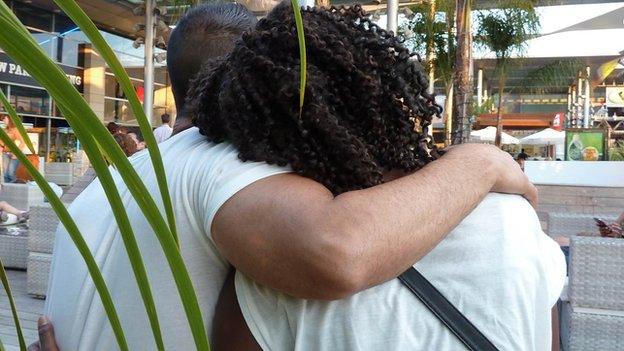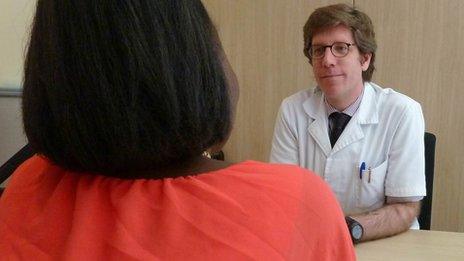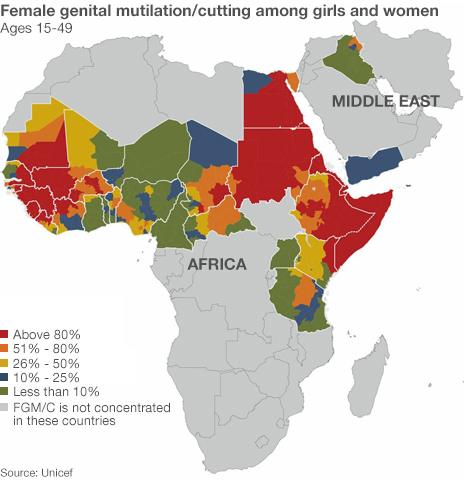The surgeon helping women after genital mutilation
- Published

In Barcelona, a doctor offers reconstructive surgery to women of African origin who were subjected to female genital mutilation (FGM) as children - but some experts say the operation cannot possibly work, and undermines the campaign to prevent FGM being carried out in the first place.
It is three weeks before her operation, and Wenkune is scared.
"Any surgery is frightening, but this is so serious, it affects you a lot. It's hard to imagine that something that was taken away from you so long ago can be replaced. You have no idea how you will face the change that's coming," she reflects.
Wenkune was born in Burkino Faso and has been living in Spain for 10 years. She is nearly 40, the mother of four children, and an activist for women's rights. And she lives with the memories of what happened to her when she was five years old.
"It's like a film in my head. Whenever I go back to my village, I remember. The spot by the river where they cut me, the house they took me to afterwards. If you've been that maltreated and abused, it's something you just can't remove from your head."
She hopes the surgery might help her recover psychologically.
Dr Barri has operated on over 40 women so far at the private Instituto Universitario Dexeus hospital where he heads up the surgical gynaecology team. The procedure involves excavating the buried clitoris - the part that was not destroyed during the mutilation - and exposing it once more.
"The aim of the operation is to restore the clitoral anatomy and its function," explains Dr Barri.
"It means removing all scar tissue, and then identifying the remaining clitoris and replacing it in the natural place. It isn't complicated surgery."
The technique was pioneered by Dr Pierre Foldes, a French surgeon, and Dr Barri learned how to do it when he studied in Paris.
Rosa is scheduled to have the procedure on the same day as Wenkune. Rosa is 20, was born in Guinea Bissau, and has lived in Europe since she was 12. She is bright and lively, and lives with Thiago (not his real name), her Spanish boyfriend. But she is deeply troubled.
"Before I was with Thiago, I didn't realise what was wrong because nobody had touched me there. I just knew I had something weird - that some of my friends had something and I had barely anything.
"I didn't really care about it, but with Thiago… Well, he would talk about the clitoris… And when he touched me, I was very sensitive. I liked it, but it was traumatic too because I would remember when I was a child. I was five or six when my grandmother and some of her friends cut me. I remember a few images - someone holding my arms and someone else holding my legs."
Rosa hopes the operation will change the way she feels about being touched. But she wants more than that: "I want to feel like other women", she says.
Dr Barri says he hears this often from his patients: "There's a physical outcome from the procedure, but there's also a psychological one. And that's about not being different any more."
It is a complex process for these women - by seeking surgery, they are going against the traditions of their home communities.
"And that is why we don't have a whole lot of patients coming to us," says Dr Barri. "We only see women who have decided to break those community rules. The first patients we saw were very scared - it was almost like they thought they were doing something illegal."
Rosa and Wenkune both have the support of their partners, but they have told only one or two other close associates about the surgery.
There is a worry from some FGM activists that the prevention message could be undermined if African communities believe FGM is something that can be reversed. Dr Barri does not agree.
"Offering reconstruction and talking about it is a very good tool to do prevention," he argues. "We sometimes go out and give presentations to women's associations and NGOs, and we also talk to the parents of our patients. They are surprised to find out what women lose when they undergo FGM. And when information gets to parents, they don't mutilate their daughters."

On the day Rosa and Wenkune are admitted to hospital they are both extremely nervous. Wenkune has brought her Bible with her to give her courage.
The operation takes less than an hour. They stay overnight at the hospital in private rooms, and go home the next day. Dr Barri says the results of the operation are usually good.
"About 90% have good anatomical restoration - that means it's not perfect, but someone who doesn't really understand a lot won't see any big difference. And 70% of patients recover feeling of the area."
Last year Dr Pierre Foldes - the pioneer of the surgery - and his colleagues published a study in the Lancet. In 11 years, his team operated on nearly 3,000 women. A one-year follow-up was attended by 866 or 29% of those patients: 821 reported an improvement, or at least no worsening, in pain; 815 reported clitoral pleasure; and 431 experienced orgasms.
Although there was no control group, on the face of it it sounded positive. But in a follow-up letter to the Lancet, a heavyweight British team - consultants in the specialisms of gynaecology, obstetrics and psychology - took issue with the study.
"The claims are not anatomically possible," they wrote. "Where the body of the clitoris has been removed, the neurovascular bundle cannot be preserved… There is therefore no reality to the claim that surgery can excavate and expose buried tissue… The campaign against FGM could be undermined by a false proposition that the ill effects can be reversed."
Dr Barri is impatient with the critique.
"It's a matter of knowing what you're talking about," he says. "I've never seen any mutilated woman without remaining clitoris. Whenever we need to remove the whole clitoris - for example in the case of cancer - it's not an easy thing to do.
Normally the patients, at least the ones that survive the FGM, will always have a remaining clitoris. So they can always benefit from replacing it in the right place."
Two weeks after the operation, Wenkune is upset.
"I'm having a bad time because of the pain I'm in," she says. "It's like I'm reliving the moment they mutilated me."
Rosa is recovering faster. "I'm very well… At first it was a bit painful, but little by little, I'm getting better. I hope that in the UK, people will get to know that the best surgeon in the world is in Barcelona."
Four months later, Rosa is smiling and laughing as she talks about her sex life post-surgery.
"I haven't completely recovered sensation. But on Wednesday I had my first orgasm. It was much better than before! Now I feel like a woman."
But her partner, Thiago, says the operation hasn't made any difference to how Rosa feels about being touched.
"She gets those images of her grandmother in her head - you don't forget those things," he says.

Wenkune has struggled since the operation. She hasn't healed well, and her feelings about the surgery are complicated.
"More than anything, more than sex, what I wanted was my old body back - the body I had as a child before I was cut. And every time I have a bath now I look at myself and I don't see that body. And that makes me sad. And of course if you're sad, sexually, it doesn't work."
But Wenkune does not blame Dr Barri for how she feels. And at her next appointment with him, he tries to reassure her that everything is as it should be, physically.
"She needs to be convinced. But when I see her after the summer she will be happier than she is today."
Is Dr Barri promising these women more than he can deliver? He says that is not the case.
"The results when you look at them globally must encourage us to offer surgery to women with FGM. But it's true that this is surgery, it's not a car you buy. And you can't always get a 100% result."
Whatever the efficacy of surgery, it can never change the past for women like Rosa and Wenkune.
"The only solution - before you even get to reconstructive surgery - is not to practise FGM in the first place, and to fight to protect women and girls", says Wenkune tearfully. "I hope I can teach the whole world about the harm that FGM does."
The names of the patients have been changed at their request.